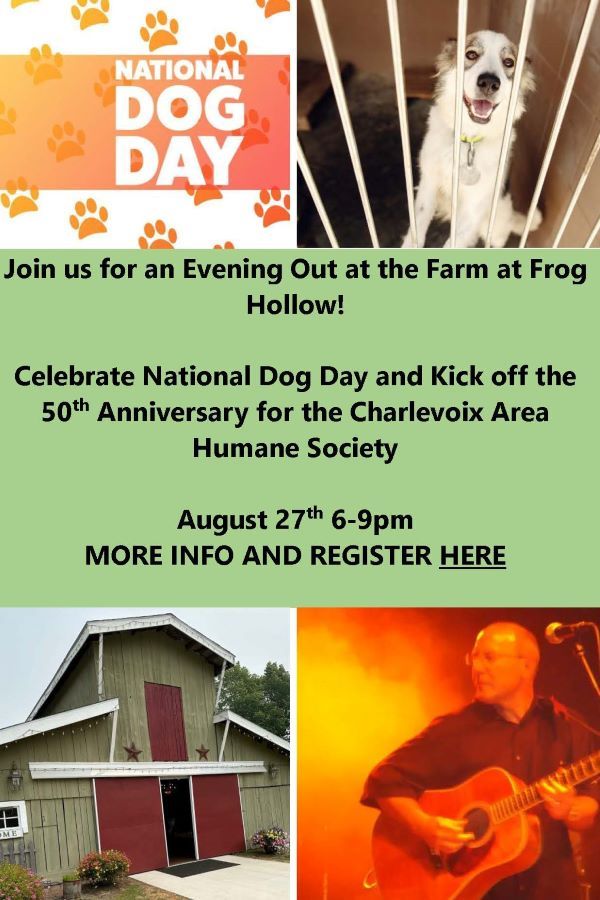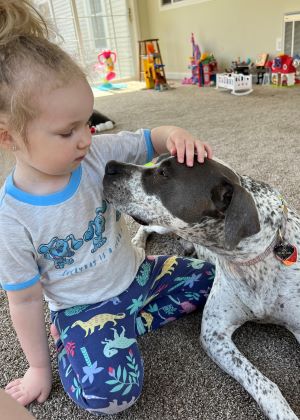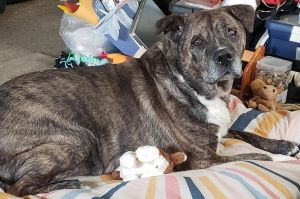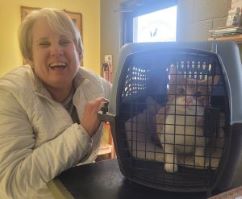

Join us at Frog Hollow!
Support the mission of the Charlevoix Area Humane Society and enjoy a wonderful evening at the Farm at Frog Hollow, located at 2750 M-75, Boyne City, MI between Boyne City and the Village of Walloon. There will be world class entertainment by renowned singer songwriter Andy Hopping included.
- Grilled Hotdogs/Brats chips and non-alcohol beverages included in the ticket price.
- Bring your own adult beverages and a comfortable chair if you like.
- Tickets are only $25 (unless you want to pay more)
Limited seating available, get your tickets now!







Tips to Help Care for Aging Pets
(article courtesy of Danielle Calma, Well+Good)
Aging comes for everyone, including our pets. As they get older, they require special care to ensure they thrive in their golden years, just like humans do. Many senior pets are susceptible to age-related health issues, such as arthritis and cognitive dysfunction, and these can often manifest in ways that aren’t so obvious. The best thing an owner can do is ensure that their senior pets are healthy and happy as they embark on this milestone. Ahead, licensed veterinarians offer their expert advice on how to care for an aging pet.
- Know your pet’s habits
Your pet’s habits will likely change as they age, and according to veterinarian and animal behaviorist Paola Cuevas, DMV, it’s important to observe how their habits evolve over time. Dr. Cuevas says to pay especially close attention to changes in their appetite, physical activity, sleeping patterns, and the frequency in which they urinate and defecate. If you notice any changes, or at least suspect them, it’s crucial to report them to your veterinarian, says Dr. Cuevas. “Behavioral and habit changes are usually signs of age-related health changes,” she explains. “This knowledge will help your veterinarian make an accurate diagnosis and thereby create an early management treatment for your pet.”
- Schedule regular veterinarian check-ups
While essential to schedule routine check-ups for a pet at every age, it becomes all the more important for an aging pet. “Senior pets have higher chances of developing health issues,” says Dr. Cuevas—and many times, the warning signs of many health problems aren’t noticeable until they advance to later stages. Even the most attentive owners can miss the early signs of a health issue, and it doesn’t help that pets are unable to communicate how they’re hurting or mask their pain or discomfort—the latter of which is particularly common among felines. Dr. Cuevas encourages pet owners to schedule trips to the vet at least twice a year or more, depending on a pet’s needs. “An early diagnosis and treatment can increase the chances of recovery or improve management,” she says.
- Ensure your pet continues to exercise
An aging pet isn’t often as limber as they were in their youth, and they can experience aches and pains, or even arthritis. While tempting to allow your companion to keep to the couch, it’s important that they continue exercising. “Just like humans, pets benefit from keeping active and moving,” says Dr. Cuevas, helping promote circulation, maintain a healthy metabolism, and preserve their muscle mass and mobility. That said, it’s essential to adjust your pet’s exercise accordingly to prevent exercise from becoming a painful endeavor. A senior dog with joint issues, for example, may benefit from shorter walks to avoid injuries.
- Keep your pet sharp
Just as physical exercise keeps your pet healthy, mental exercises can keep an aging pet’s brain in optimal shape—which is especially important as many experience cognitive decline. Consider looking for age-appropriate toys that they can engage with without having to overexert themselves. Many senior dogs and cats won’t turn their noses up at enrichment toys, like food-dispensing puzzles, which come in varying levels of difficulty. You can also consider snuffle mats to encourage a pet’s foraging skills as they sniff around for treats and dry kibble between the mat’s fabric strands. Dr. Cuevas says that you can also make your own toys at home, using recyclable materials when you’re in a pinch.
- Opt to change what your pet eats
If your senior pet has specific health needs, you might also want to consider making changes to what they eat—and the best way to determine which diet is best for your companion is to consult a trusted veterinarian. “The Association of American Feed Control Officials (AAFCO) has no standard for a senior pet diet for a reason—there are no specific senior diets that work for all pets,” says Dr. Cuevas. “The best diet for your pet will depend on its specific health needs.” With this in mind, ask your vet during a check-up if your pet can continue with its regular diet or if they could benefit from, say, a kidney or joint support diet, or one with few calories to avoid unhealthy weight gain.
- Adapt your aging pet’s environment to their needs
Although an aging pet’s needs will vary widely, certain environmental changes can make their everyday life safer and more comfortable—and there are many products that cater to senior dogs and cats. Ultimately, though, “it’s important to consider your pet’s condition,” says Dr. Cuevas. Veterinarian Chyrle Bonk, DMV, shares this sentiment: “You don’t want to suddenly change things—especially if your older pet is experiencing cognitive decline or eyesight issues,” she adds.
Shelter Wish List
Pet Supplies
- Cat and Dog Toys
- Dog Collars
- Fleece Blankets - Large
- Herm Sprenger Chain Training Collars
- Herm Sprenger Quick Release Collars
- Interactive Food Feeding Dishes
- Leather Leashes (no retractable ones please)
- Martingale Collars
- Peanut Butter (xylitol free)
- Purina Kitten and Cat Food
- Soft Training Treats
Cleaning Supplies
- Bleach
- Dawn dish soap
- Liquid laundry detergent
- Wash cloths
Office Supplies
- Postage stamps
- Computer paper
- 9V batteries
SHELTER HOURS
Monday–Friday: 12:00–5:00 pm
Saturday: 12:00–5:00 pm
Sunday: Closed
Or by appointment.
OFFICE HOURS
Monday–Friday: 10:00 am–5:00 pm
Saturday: 12:00–5:00 pm
Sunday: Closed
During any holiday season, please contact the shelter for changes in hours.
Shelter Location -- 614 Beardsley Street -- Boyne City, Michigan 49712
Phone (231) 582-6774 -- Fax (231) 582-6776
Pets@charlevoixhumane.org
Dedicated to the protection and care of all animals, the Charlevoix Area Humane Society is an independent non-profit 501(c)3 no-kill animal shelter that has been serving pets and their humans in Charlevoix County since 1974. We rely almost exclusively on donations and fundraisers to help the lost, neglected, abused, and abandoned animals of Charlevoix County.

